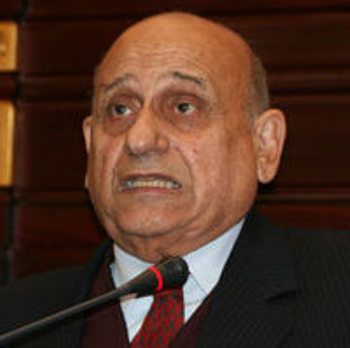‘Our goal was to find a way out for Sudan president’ says Mbeki panel member
November 1, 2009 (WASHINGTON) – The African Union (AU) high level panel on Darfur wanted to find a way out for Sudanese president Omer Hassan Al-Bashir from the International Criminal Court (ICC) indictment, one of the commission members said today in an interview.

The panel was formed weeks before the ICC issued an arrest warrant for Bashir prompting skepticism from Darfur rebels and other critics who say that the AU wants to circumvent the indictment, something which Mbeki has denied in meetings with Darfur IDP’s.
Mbeki called for a hybrid court to try war crimes suspects and changes to Sudanese laws. It took no position on the ICC warrant except to say that the Hague-based tribunal cannot try all the suspects, effectively supporting its work.
However, one of the members of the AU panel said that the goal of the mission was to give Bashir an exit strategy from the ICC row.
“Incriminating the president is out of question and fundamentally unacceptable” the former Egyptian foreign minister said in an interview with the Egypt based Al-Masry Al-Youm newspaper.
“Our [Mbeki panel] goal was to find a way out [to Bashir] from the dilemma of the ICC that sparked a great deal of controversy,” Maher said.
The AUPD member, who served as Egypt’s Foreign Minister from 2001 until 2004, said that the ICC case against Bashir was “political” in nature and “biased” against the Sudanese head of state “with exaggeration in depicting the situation”.
“Demanding the prosecution of an African head of state before an international tribunal is totally unacceptable” the former Egyptian top diplomat said.
Maher said that achieving justice in Darfur “will be through Sudanese prosecution with African members selected by Sudan and agreed upon by the AU”.
“We are not prosecutors. We observe the situation and make sure that perpetrators are brought to justice and this is the task of the Sudanese judiciary. Whoever is involved should be prosecuted,” he said.
Maher noted that the panel found that dispute over resources between different ethnic groups as one of the “incorrect” situations during their work requiring a ceasefire, repatriation and providing compensation to the displaced.
The remarks made by Maher will likely cause a huge embarrassment to the AU and the panel chief, Mbeki who sought to quell accusations on seeking to protect the Sudanese president.
Mbeki is now heading the implementation team established by the AU to ensure that the recommendations see the light.
Alex De Waal, a Sudan expert who was also an adviser to the panel, writes in his blog ‘Making Sense of Darfur’, about what they encountered in their discussions on justice with various parties they met. De Waal gives examples of how the panel was initially met with intense skepticism on its impartiality by IDP’s and accusations that it is a cover up to protect Bashir from ICC prosecution.
“The allegation that Pres. Mbeki was intent on salvaging Pres. Bashir came up several times in the discussion. One woman said, “We fear you are here to defend the criminal Omar al Bashir.” One man stood up and said, “Seven members of my family were killed. How should I feel if Thabo Mbeki says that Omar al Bashir should not go to court?” De Waal writes.
“Pres. Mbeki challenged him, “from where did you get this information that I said that President Bashir should not go to court?” The man responded, “it is well known.” He then said that the Africans were the ones saying Bashir should not go to the ICC, citing the early June meeting in Addis Ababa to discuss the African position on the ICC. This reply did not satisfy Pres. Mbeki, who continued to press him, “I asked you a question. Please answer it. You made an allegation. From where did you get this information?” The man said it was the BBC”.
In Paris, the head of Sudan Liberation Movement (SLM) Abdel-Wahid Al-Nur reiterated his rejection of the hybrid court saying his movement only accepts the ICC intervention in the Darfur crimes.
Al-Nur stressed that the war in Darfur “is not tribal” adding that the government arming of militias triggered the conflict and the humanitarian situation.
He further said that reconciliation “occurs after peace process is concluded and through local mechanism not requiring international mechanisms”.
The UN says up to 300,000 people have died and 2.7 million fled their homes since ethnic minority rebels in the western region of Darfur first rose up against the Arab-dominated government in Khartoum in February 2003.
The Sudanese government disputes the death toll saying 10,000 people died.
(ST)
